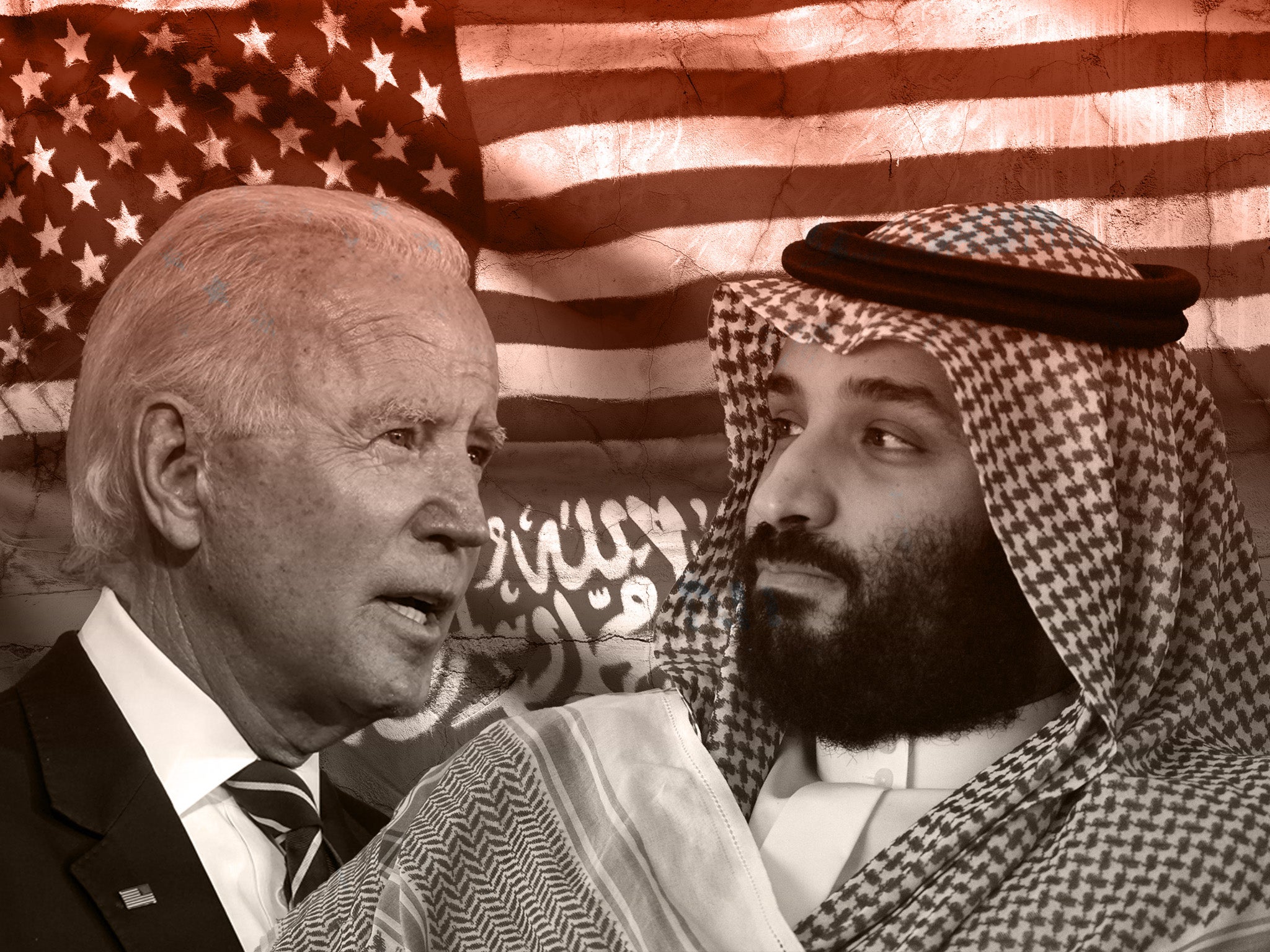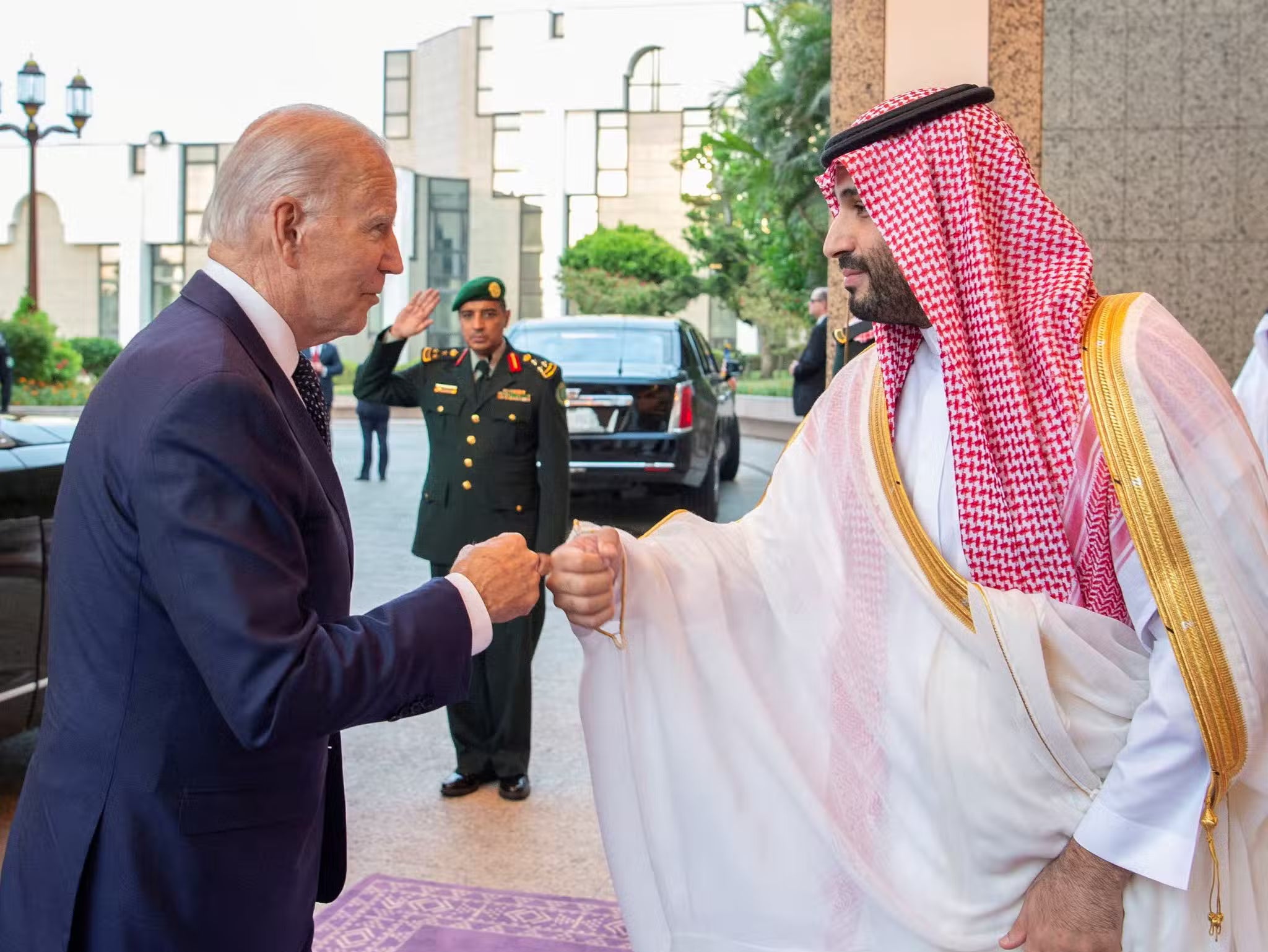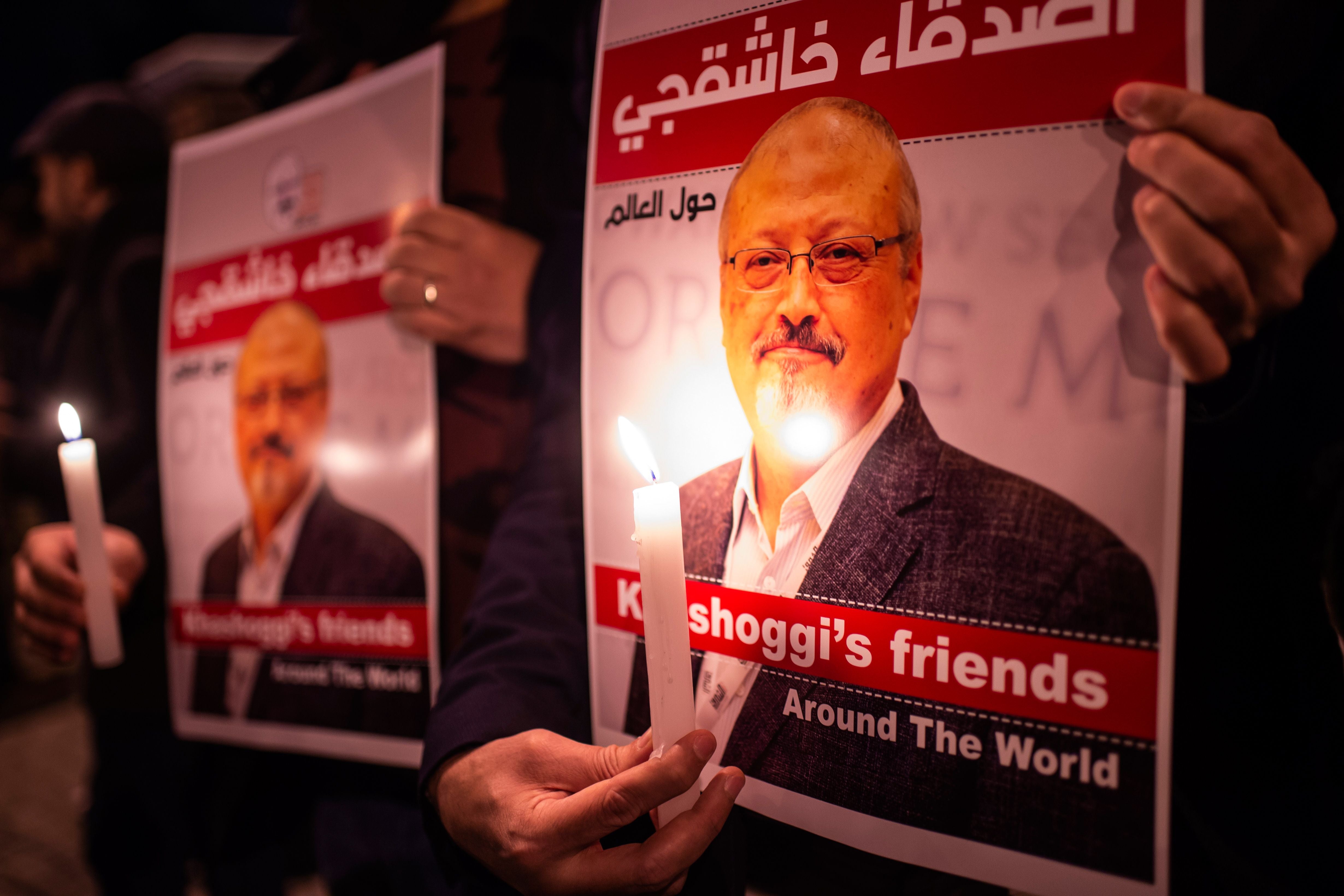Biden vs the Kingdom: Is this the end of the US-Saudi relationship?
The US-Saudi relationship endured a crippling oil embargo and the 9/11 attacks. Has the relationship run its course? Richard Hall investigates


Joe Biden’s presidency was always going to be a stress test for the US-Saudi relationship. On the campaign trail, Mr Biden vowed to make Saudi Arabia a “pariah” over its pervasive human rights abuses and that it would “pay the price” for the killing of Washington Post contributor Jamal Khashoggi.
But few could have predicted how far the partnership, defined for years by massive US arms sales to Riyadh in return for cooperation on security and energy, would deteriorate.
Signalling a potential departure from a decades-long strategic relationship, Mr Biden said on Wednesday that there would be “consequences” for Saudi Arabia after it cut oil production, along with other OPEC countries and Russia, in a move that will likely cause a spike in energy prices around the world.
Saudi Arabia said the reduction was designed to “maintain a sustainable oil market,” but the White House has accused Riyadh of taking Russia’s side in its devastating war against Ukraine, and warned that the US is looking to “re-evaluate” its relationship with the Kingdom as a result.
Those comments represent a threat to upend a strategic partnership that endured the September 11 attacks and a crippling oil embargo in the 1970s, one that expert analysts say will not easily be mended.
“I’ve been going to Saudi Arabia for 43 years and never have relations been this bad,” Karen Elliott House, author of Saudi Arabia — Its People, Past, Religion, Fault Lines — and Future and senior fellow at Harvard University’s Belfer Center told The Independent in an interview this week.
Ms House noted that following the 9/11 attacks, US and Saudi governments “worked quietly behind the scenes to limit the damage to their cooperation,” and to “preserve the essential security relationship from the domestic outrage in America.”
“This time it is the Biden Administration that is fomenting anti-Saudi sentiment. Very different,” she told The Independent.
The relationship has weathered storms before, but this argument is just the latest in a series of disagreements between the two countries on everything from oil, war, human rights and a global outlook that is increasingly at odds. Since Russia’s invasion of Ukraine, Mr Biden has increasingly spoken of a global battle “between autocracy and democracy” — a worldview that raises its own questions about the US relationship with Saudi Arabia, which is an absolute monarchy where dissent is crushed.
The latest rupture was sparked by the decision of OPEC countries and Russia to cut oil production, a move that threatened to drive up energy prices around the world as prices are already heightened due to the fallout of Russia’s invasion of Ukraine. Crucially for the Biden administration, it raised the likelihood of a spike in gas prices in the US ahead of crucial midterm elections, which may harm Mr Biden’s Democratic party in a vote that he has defined as a battle to save democracy.
The decision angered the White House in part because Mr Biden had personally intervened to convince Riyadh to increase production in July, when he made his first visit to the Kingdom as president, and the first visit since promising to make it a pariah for the 2018 killing of Mr Khashoggi at the hands of Saudi agents.
On that visit, Mr Biden notably fist-bumped the Saudi Crown Prince Mohamad bin Salman, Saudi Arabia’s de-facto ruler and the person whom US officials believe ordered Mr Khashoggi’s killing, rather than shake his hand.
According to the Wall Street Journal, which cited Saudi government sources, the Saudis had been planning to increase oil production by 500,000 barrels a day in an overture to Mr Biden. The crown prince reduced the increase to 100,000 barrels a day. The publication notes that the US state department suggested in an email to Saudi energy minister, Prince Abdulaziz bin Salman, that he had misled the US about the size of the increase.
Publicly, recriminations began to fly. The White House said in a statement that the president was “disappointed by the shortsighted decision by OPEC+ to cut production quotas while the global economy is dealing with the continued negative impact of Putin’s invasion of Ukraine.”
Tensions accelerated on Tuesday when White House national security spokesman John Kirby said that the US was considering a rethink of the US-Saudi relationship.
"I think the president’s been very clear that this is a relationship that we need to continue to re-evaluate, that we need to be willing to revisit," Mr Kirby said in an interview with CNN. "And certainly in light of the OPEC decision, I think that’s where he is."

Saudi Arabia is the largest importer of US weapons in the world, and relies heavily on US weapons manufacturers and technicians for its security. Following Mr Biden’s visit to Riyadh in July, his administration approved a $3 billion sale of Patriot missiles. Saudi Arabia justifies its massive spending on US weapons as necessary to counter its regional rival, Iran. Successive US administrations have declared their intention to use any means necessary to stop Iran from acquiring a nuclear weapon, and have built security alliances to do so.
Those weapons sales may now be under threat. The Saudi decision to cut oil production has prompted a furious response from Democratic senators with the power to delay or halt those sales to Riyadh. For years, progressive Democrats have been calling for a halt to US weapons sales to Saudi Arabia over its war in Yemen. Nearly 15,000 civilians have been killed in the war, most of them by airstrikes carried out by the Saudi-led coalition using American-made military equipment.
This week, Bob Menendez, who chairs the powerful Senate Foreign Relations Committee, which has oversight of arms sales, said in a statement that Saudi Arabia had made a “terrible decision” to “underwrite” Russia’s war on Ukraine, and called for a halt in arms sales to Saudi Arabia.
“The United States must immediately freeze all aspects of our cooperation with Saudi Arabia, including any arms sales and security cooperation beyond what is absolutely necessary to defend US personnel and interests,” Mr Menendez said, adding: “I will not green-light any cooperation with Riyadh until the kingdom reassesses its position with respect to the war in Ukraine. Enough is enough.”
His comments were echoed by Democratic senators Richard Blumenthal and Ro Khanna, both of whom serve on the Senate armed services committee, and who have proposed legislation that would “immediately halt all US arms sales to Saudi Arabia,” they wrote in an op-ed announcing the plan.

“Saudi cannot proceed with this kind of mistake without there being some consequences,” Mr Blumenthal said at a Capitol Hill press conference on Wednesday. “The Saudis’ actions aid and abet a murderous and brutal criminal invasion by Russia. They endanger the world economy. And they threaten higher gas prices for Americans.”
The ferocity of the reaction from the US has shocked officials in Riyadh, according to Ali Shihabi, a Saudi analyst and author.
“They’re very surprised. They never expected the Americans to expect them to allow their main export, their main source of revenue, to collapse,” he told The Independent this week.
Mr Shihabi believes the current disagreements were borne of a “fundamental misunderstanding” that arose following Mr Biden’s visit to Riyadh in July.
“The feeling of the Saudi authorities is that they would increase production intelligently to make sure that the price of oil does not go up. What they didn’t promise, nor did they expect that the Americans expected them to do, was to allow the price of oil to collapse,” he said. “This nonsense about standing with Putin — when the price of oil went below zero, the Americans went ballistic and put all the pressure on Saudi Arabia to cooperate with Russia to bring the price of oil back. And there were accusations in Congress and among governors that Saudi Arabia is trying to put the shale oil industry out of business and destroy the US oil industry. People forget that. It’s amazing how short memories are, really.”
The question now is how deep the rift will go. Ms House, who has reported on Saudi Arabia for more than 40 years, believes it will not likely heal while Mr Biden is still president.
“[Mr Biden] is so clearly contemptuous of Saudi Arabia and has so insulted the Kingdom and its defacto ruler who will be around for perhaps a half-century that he can’t repair things,” she said. “Personal distrust is far too deep and personal animosity as well.”
Ms House added that the disagreements between the Biden administration and Saudi Arabia go much deeper than oil prices, and their relationship isn’t being seen by recent Democratic presidents as being as valuable as it once was, due to a greater focus on renewable energy and a move away from fossil fuels.
“Biden campaigned on cutting Saudi Arabia down to size, making it a pariah. And even when he humbled himself in July to visit Riyadh he didn’t cease the insults, telling reporters he had accused the crown prince to his face of murdering Khashoggi,” according to Ms House. “The fundamental cause of the current tension is a loss of trust in the US to protect Saudi Arabia now that the US needs Saudi oil much less than in the past.”
Mr Shihabi, meanwhile, believes that cooler heads will prevail. The partnership is too important.
“I think, ultimately, logical will prevail,” he told The Independent. “Beyond the rhetoric, America shares an interest in the free flow of oil from the Gulf. When the Americans talk about security in the Gulf, they are there to ensure the free flow of oil to their allies, to the global economy.”
“America is there to serve its own interests and the interests of its allies, and frankly, it gives it leverage also over countries like China, which depend on oil coming from the Gulf, but also Japan and also India, and also Europe. So there’s a public good there that I think American politicians in their emotions, prior to the midterm elections, are confusing,” Mr Shihabi added.
In the meantime, human rights groups have welcomed the renewed focus on Riyadh.
“It’s completely unsurprising that Saudi Arabia’s de facto ruler, Crown Prince Mohammed bin Salman, shares neither America’s purported values nor short-term interests,” Michael Page, deputy Middle East director at Human Rights Watch, told The Independent.
“As a leader who has overseen brutal repression at home and transnational murder and war crimes abroad, how could any of Biden’s so-called foreign policy experts have tricked themselves into believing MBS would side with Biden over Putin, whether on oil production or human rights?”
Join our commenting forum
Join thought-provoking conversations, follow other Independent readers and see their replies
Comments



Bookmark popover
Removed from bookmarks